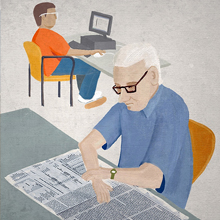Information, education and participation
In order to promote the communitarian awareness and the citizens participation, it is necessary to assure a suitable one environmental information and the free access for them to the information; this means, the possibility of acceding o any type of information referred to the environmental conditions without any obstacles. The public access to this information allows the society to know their present situation, as well as the mechanisms to improve it. It must also include not only the data referred to the general state of environment (for example the quality of the air and the water) but also the concrete and present results of monitoring and investigations on polluting agents and their effects in the human health, the environmental impact of precise activities of the industry, measures of prevention adopted by the public sector, as well as the respective normative and procedures to enable the right to a healthful environment.
It is being more and more easier to promote the availability of the information to the public thanks to the mass media (press, radio, TV), and the new communication technologies such as Internet and big data bases, and to other resources like the labelled products.
In Spain, the Ministry of Environment, some independent communities, city councils and other organisations have been developing Systems of Environmental Information (SEI), resources that allow the gathering, structuring, access and diffusion of the information relative to environment.
The right to the information takes legal substance in the letter from the Declaration of the Human rights, approved in Paris in 1949, that in its 19th article dictated: “All person has the right to the freedom of opinion and expression; this right includes the one of not being bothered because of opinions, the right to investigate and to receive information and opinions and the right to spread them without limitations of borders, by any means of expression”.
Other international treaties recognise this right in similar terms; among them, the Convention the International of Civil and Political Rights, approved by the UN in 1966; the European Convention of the Rights of the Mankind, approved by the European Council in 1950; the Declaration of the Civil, Political and Cultural Rights in Tehran in 1973; the Act of Helsinki of 1975; and the Pact of San Jose of Costa Rica (American Convention of Human Rights) in 1984.
The Declaration of Río, document of the Conference of the United Nations on Environment and Development (CUNED) that took place in 1992, emphasised the role of the environmental information. The subjects referred to the environmental information impregnated most of the chapters of adopted Program 21 in this event. Principle 10 guarantees the citizen participation and the public access to the environmental information: “The best way to deal with the environmental matters is with the participation of all the interested citizens, at the level that corresponds. In the national plane, all persons must have adapted access to the information on environment arranged by the public authorities, including the information on the materials and the activities that lock up danger in their communities, as well as the opportunity to participate in the processes of decisions taking. The states will have to facilitate and foment the sensibilisation and the participation of the population by putting the information at everyone’s disposure”.
In 1992, the European Directive on Freedom of Access the Information regarding to Environment came into effect. It guarantees the freedom of access and diffusion of the information by the public authorities. The Directive was transposed to Spanish legislation by the promulgation of the Law 38/1995. Besides, from 2001, the Agreement on Access to the Information, the Participation of the Public in Decision taking and the Access to Justice in Environmental Subjects from the Economic Commission of the Nations United for Europe (CEPE/ONU), known as per the Aarhus Agreement, entered in force, to which dispositions the communitarian legislation is adapting. In this frame, the Directive 2003/4/CE of the European Parliament, relative one to the access of the public to the environmental information, was promulgated in January of 2003.
The education is an ideal scope to promote environmental justice. It is necessary that the society is educated regarding those problems affecting certain sectors of the population. This implies an analysis of the life service of products and activities that cause an impact in environment, among other subjects.
The primary and secondary schools can offer environmental education training programs that contemplate the environmental sustainability and the non-discrimination. In addition, communal factories can be fomented to enable the civil society to know the nature and possible activities of defense against the environmental discrimination.
Part of the problem of the environmental discrimination comes from the lack of participation of the affected parts, both in the planning and in the implementation of the activities.
The solution of the environmental problems and the public health does not only concern the administrative agencies of the State; the citizens initiative and the communitarian participation in the diversity of cultural, social, scientific, economic and technological variables implied in the processes of decision making are more and more important for a better quality of life. We must bear in mind that each of us can help to protect or to degrade the environment.
The studies of environmental impact disposition of the members of the civil society, governmental organizations must be participative, in order to control and evaluate its quality.
But the participation by itself is not the solution. The participation must as well be informed, so that the population has the necessary knowledge to be able to make their decisions regarding to which are their problems and how they want to solve them. For that reason the participation must be complemented with a free access to the information.



